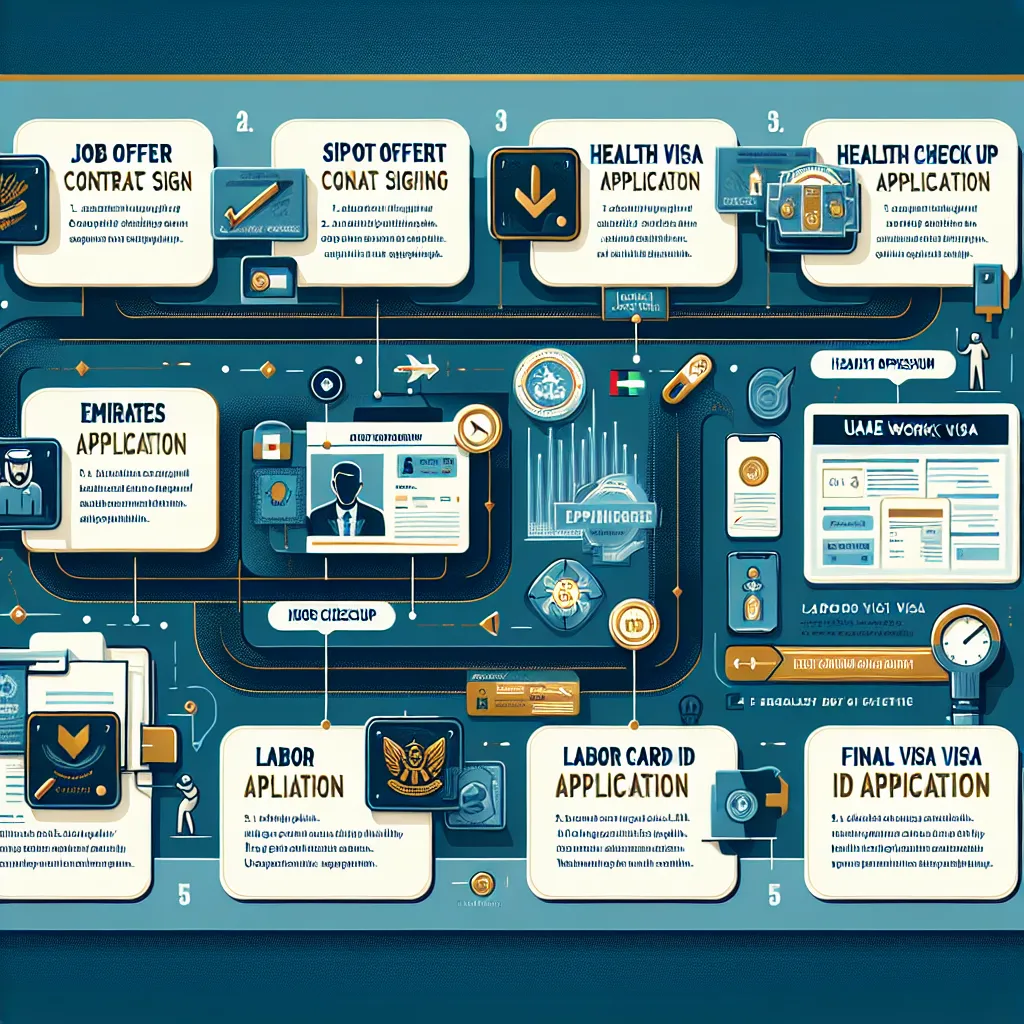The UAE provides a straightforward process for obtaining work visas; however, it is crucial to fully understand the necessary steps and requirements beforehand. Generally, the process starts after you have secured a job offer, as your employer typically sponsors your visa.
Step 1: Employment Contract and Sponsorship
To begin with, you will need to obtain an employment contract. Once you’ve received a job offer, your employer will handle most of the visa application process on your behalf. They will apply for a work permit through the Ministry of Human Resources and Emiratisation (MOHRE) and initiate the necessary paperwork.
Step 2: Medical Testing
Next, you must undergo a medical examination to ensure compliance with health regulations. This usually includes tests for infectious diseases such as HIV, tuberculosis, and hepatitis. Passing the medical test is a critical component of the visa approval process.
Step 3: Document Submission
In addition to the medical test, you’ll need to gather and submit essential documents. These include a valid passport, passport-sized photographs, proof of qualifications, and the signed employment contract. Your employer may also require additional paperwork, depending on the nature of your job and the specific emirate where you’ll be working.

Why Is a UAE Work Visa Important?
A UAE work visa, therefore, not only serves as your official authorization for employment in the country but also ensures that you can legally work. Without it, however, you cannot lawfully engage in employment activities or, furthermore, access essential employment benefits such as health insurance, residency privileges, and other related advantages.
Key Benefits of a UAE Work Visa:
- Legal authorization to work in the UAE.
- Access to health insurance and other employment benefits.
- Residency status for the duration of your employment contract.
Types of UAE Work Visas
Understanding the types of work visas available is critical to ensuring you apply for the right one.
1. Standard Employment Visa
This type of visa is the most common option for professionals who are hired by UAE-based companies, and it is typically sponsored by the employer.
2. Freelance Work Permit
For individuals who wish to work independently, the UAE, therefore, provides freelance permits specifically within designated free zones.
3. Golden Visa
The Golden Visa is aimed at highly skilled professionals, entrepreneurs, and investors, offering long-term residency without the need for a sponsor.
How to Apply for a UAE Work Visa

Applying for a working visa in Dubai can seem daunting, but breaking it into steps makes the process manageable.
Step 1: Receive a Job Offer
Before you can apply for a work visa, you need a job offer from a UAE-based employer. This is a mandatory step, as your employer will sponsor your visa.
Step 2: Medical Fitness Test
As part of the visa application process, you’ll need to undergo a medical fitness test to ensure you’re healthy and fit to work.
Step 3: Submit Documents
You’ll need to provide the following documents:
- A valid passport (6+ months of validity).
- Passport-sized photographs.
- A copy of your job offer letter or employment contract.
- Attested educational certificates (if required).
Step 4: Receive Your Work Permit
Once your documents are approved, you’ll receive a work permit, which allows you to enter the UAE and start your job.
Costs Associated with a UAE Work Visa
The costs associated with obtaining a UAE employment visa can vary significantly depending on factors such as the type of visa and the duration of your stay. Generally, your employer is responsible for covering these expenses; however, it is crucial to confirm this during your job negotiations to avoid any misunderstandings. Furthermore, many employers may include additional visa-related expenses as part of your employment package. For instance, costs for medical tests, Emirates ID fees, or even family sponsorship, if applicable, might be covered. Therefore, clarifying these details in advance not only ensures there are no unexpected surprises later but also helps you gain a clearer understanding of the full scope of your benefits.
Common Challenges Expats Face
While the UAE work visa process is generally straightforward, expats may still encounter certain challenges. Below are some common issues and tips to address them effectively:
Employer Miscommunication
Before signing your employment contract, confirm all details regarding visa sponsorship, associated costs, and responsibilities with your employer to avoid misunderstandings later.
Document Authentication
Ensure all necessary documents, including degrees and certificates, are fully attested by the appropriate authorities in both your home country and the UAE to avoid delays or rejections.
Medical Test Issues
Failing the mandatory medical fitness test can result in visa denial. Address any potential health concerns in advance to ensure you meet the requirements.
Tips for a Smooth Visa Process
To make the process of obtaining your employment visa in Dubai as seamless as possible, keep the following tips in mind:
- Stay Organized: Keep all your documents in one place and ensure they are up-to-date.
- Communicate Clearly: Regularly follow up with your employer or visa agent for updates.
- Understand UAE Labor Laws: Familiarize yourself with local labor laws to understand your rights and responsibilities as an employee.
Examples of Successful Expats
Case Study 1: Sarah, a Marketing Professional from the UK
Raj encountered delays in his visa processing due to incomplete documentation. After promptly resolving these issues and submitting all necessary paperwork, he successfully secured his employment visa. Today, he works for a prominent tech company in Dubai.
Case Study 2: Raj, an IT Specialist from India
Raj initially faced delays in his visa processing due to incomplete documentation. However, once he addressed these issues and submitted the required paperwork, he successfully obtained his employment visa. Consequently, he now works for a leading tech company in Dubai.
FAQs About UAE Work Visas
1. How long does it take to process a UAE work visa?
On average, it takes 2–3 weeks, but it can vary depending on the employer and the type of visa.
2. Can I switch jobs on the same visa?
Yes, but you’ll need a No Objection Certificate (NOC) from your current employer to transfer your visa to a new employer.
3. Can I sponsor my family with a UAE work visa?
Yes, once you have a valid work visa and meet the minimum salary requirement, you can sponsor your family members.
Conclusion: Ready to Work in the UAE?

Securing a working visa in Dubai is your first step toward building a successful career in the UAE. By understanding the process, staying organized, and addressing potential challenges, you can make your transition to the UAE seamless. Once your visa is approved, you’ll need to familiarize yourself with local labor laws, workplace culture, and professional expectations to ensure a smooth integration into your new environment. Networking is also key—connecting with industry professionals and joining local business communities can open doors to new opportunities and help you establish yourself in the region.
Our Blogs
A Complete Guide to Networking in Dubai for Career Growth
Networking is a vital component of career advancement, especially in a dynamic and diverse city like…
Cost of Living in Dubai: What Job Seekers and Expats Should Know
Dubai, a dazzling city in the United Arab Emirates, is renowned for its luxury lifestyle, modern arc…
UAE Work Visa Guide: What Expats Need to Know
The UAE provides a straightforward process for obtaining work visas; however, it is crucial to fully…
A Career in Healthcare and Pharmaceuticals: Your Guide to Success
The healthcare and pharmaceutical industries are among the most vital sectors globally, contributing…
A Career in Oil and Gas: Your Guide to Success
Dubai’s diverse economy and rapid development have made it a global hub for career opportunities, at…
Relocating to Dubai: A Practical Guide for Expats
Dubai is a city of opportunities, offering a luxurious lifestyle, tax-free income, and a multicultur…





